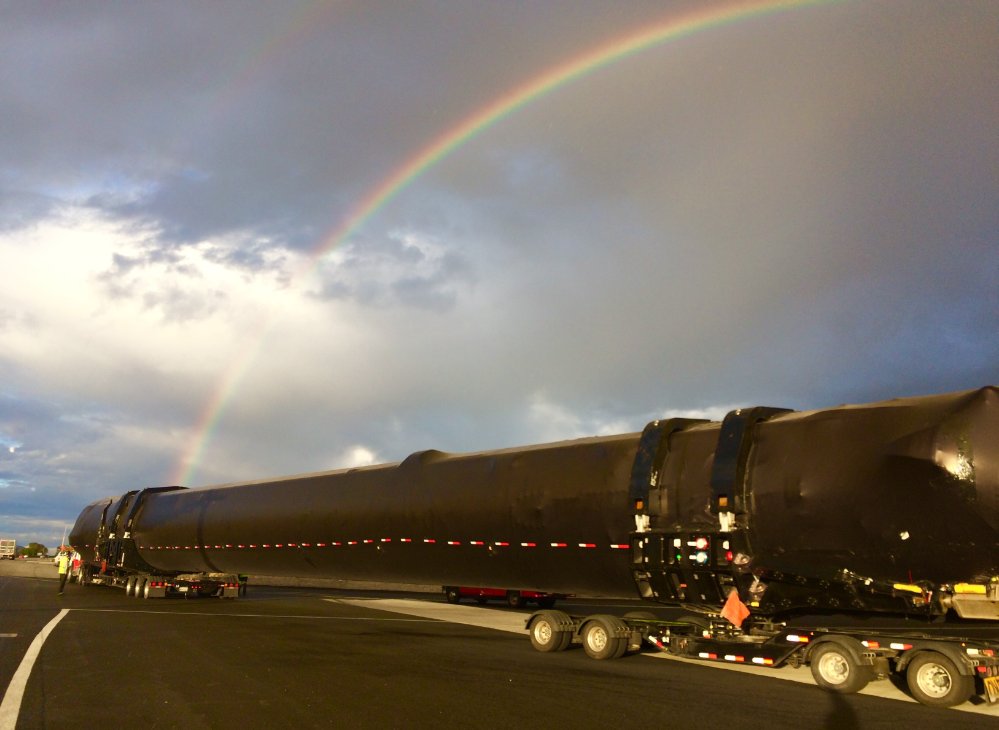SpaceX Postpones Falcon 9 Rocket Launch Resumption to January 2017

SpaceX Falcon 9 Stage 1 arriving in California for Iridium NEXT launch – with a Rainbow! Credit: SpaceX/Iridium
SpaceX is postponing the resumption of launches for their Falcon 9 rocket into early January 2017 as they continue to deal with the fallout from the catastrophic launch pad explosion in Florida that destroyed a Falcon 9 during preflight test operations three months ago.
The new space aerospace company led by billionaire CEO Elon Musk had planned to restart launches as early as next week on Dec 16, for the boosters ‘Return to Flight’ Falcon 9 mission from California with a payload comprising Iridium Corporation’s next-generation communications satellites.
The Iridium mission is the first of seven planned launches.
“Iridium is replacing its existing constellation by sending 70 Iridium NEXT satellites into space on a SpaceX Falcon 9 rocket over 7 different launches,” noted Iridium in a statement.
However, the launch date was pending until approval by the FAA – which will not yet be forthcoming in time to meet the Dec. 16 target date.
The FAA can’t approve a launch until they have a report to review from SpaceX. And that final accident investigation report has not yet been written by SpaceX or submitted to the FAA.
In a new update, SpaceX announced that they “are finalizing the investigation into our September 1 anomaly” and need to “complete extended testing” – thus inevitably delaying the hoped for blastoff into early January 2017.
One should not be surprised if there are further delays into the ‘Return to Flight’ since the determination of root cause, testing fixes and finally implementing effective corrective action will take time. This is rocket science and it’s not easy.
SpaceX is still investigating why the rocket unexpectedly erupted into a humongous fireball at pad 40 on Sept. 1, that completely consumed the rocket and its $200 million Amos-6 Israeli commercial payload during a routine fueling and planned static fire engine test at Cape Canaveral Air Force Station in Florida.
The explosive anomaly resulted from a “large breach” in the cryogenic helium system of the second stage liquid oxygen tank and subsequent ignition of the highly flammable oxygen propellant.
“We are finalizing the investigation into our September 1 anomaly and are working to complete the final steps necessary to safely and reliably return to flight, now in early January with the launch of Iridium-1,” SpaceX announced in a statement.
Iridium Communications has recently announced that the first launch of a slew of its next-generation global satellite constellation, dubbed Iridium NEXT, would launch atop a SpaceX Falcon 9 rocket on December 16, 2016 at 12:36 p.m. PST from SpaceX’s west coast launch pad on Vandenberg Air Force Base in California.
But since only 3 months had elapsed since the accident – the second in 15 months – more time was clearly needed to be certain the rocket was truly flight worthy.
“This allows for additional time to close-out vehicle preparations and complete extended testing to help ensure the highest possible level of mission assurance prior to launch,” SpaceX elaborated.
Iridium also issued a statement supporting the launch delay and expressing continued confidence in SpaceX.
“Iridium supports SpaceX’s announcement today to extend the first Iridium NEXT launch date into early January, in order to help ensure a successful mission. We remain as confident as ever in their ability to safely deliver our satellites into low Earth orbit.”
Stay tuned here for Ken’s continuing Earth and Planetary science and human spaceflight news.
The post SpaceX Postpones Falcon 9 Rocket Launch Resumption to January 2017 appeared first on Universe Today.